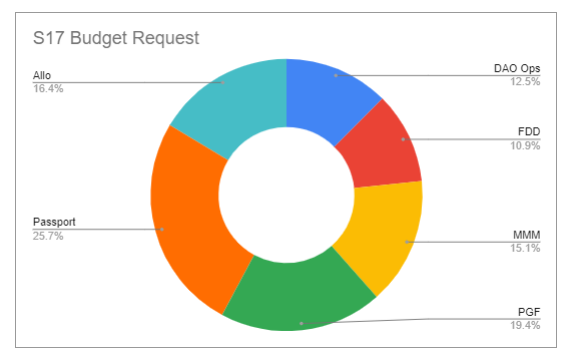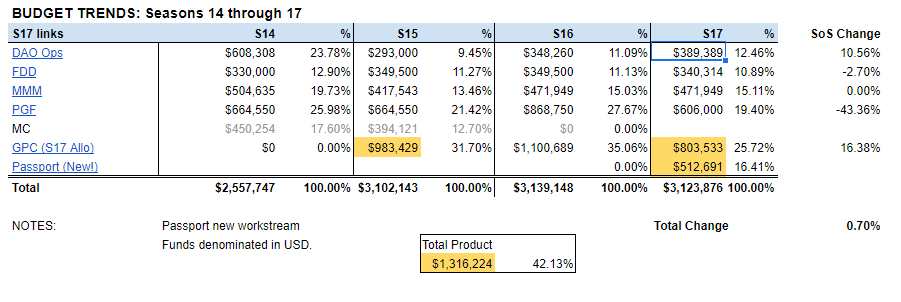To start, I want to clarify for the audience that I am reviewing this budget in the role of a steward who is assigned to review DAOops S17 budget.
This feedback is intended for the “DRAFT” phase of the review process wherein feedback still has an opportunity to work its way into the proposal before it is posted as an “INTEGRATED” proposal and put up for vote on Snapshot.
I am hesitating on supporting this budget as is. Here are a few key reasons:
-
The increase in in the seasonal budget amount for the last 2 budgets during a time when the CSDO agreement was to have “lighter” seasonal check-ins because we are focusing on launching the protocol and committed to with the expectation that we keep our budgets flat.
-
There is a lot of “extra” in the likely projects/tasks and the most important work doesn’t stick out.
-
I would like to see more concrete planning in terms of the DAOops plan to break into end to end accountable scopes of work.
Increase in season budget total
Perhaps this increase is due to team retreat expenses? I can’t tell from this document.
I do know we hired a technical support lead. This specific call out would help me understand and justify an increase.
Overall, I’m not personally happy with breaking the commitment to keep flat budgets with the lighter check-in to the tune of almost 30% over two seasons! However, I do not know if the reason is legitimate due to the budget not taking space to call out the NEED for the increase.
Most important work doesn’t stick out
It feels like a group of individuals with individual accountabilities and not a team. This is a mistake I have made in the past and @tigress has been great at pushing FDD in the right direction. As I read this, it feels like it comes from the same place where our problems have - a need to justify the value of the individuals rather than the value of the team.
I’m not sure what part of our system does this, but it is very clear when you look at the budgets of the workstreams which have little fear of a poor outcome when the vote happens vs the workstreams which have much lower delegation or influence.
This is a symptom level problem and can easily be fixed. However, understanding the root cause is MUCH deeper than a DAOops bugdet problem. My intention in calling out the root problem is to allow others to recognize a systemic issue while also HELPING this workstream to mitigate the problem.
No future planning for post protocol launch
I’d like to see a future plan for end to end accountable workstreams
I do not expect you to change structure this season. Other budgets either have addressed the issue for this season or are painting a picture for the future. What might DAOops look like?
It occurs to me that almost all the functions that DAOops is responsible are in support of key stakeholder groups:
- Governance = Token Holders & Stewards
- People Ops & Tooling = Contributors
- Support = Users
Are we putting the right amount of effort to each of these constituencies?
Does the DAOops cover over multiple distinct scopes of work provide positive sum results?
DAOops could be more proactive in addressing upcoming issues
Another item not mentioned here is that CSDO has an issue coming up that will likely benefit from a proactive response. As FDD dissolves, this means a change in the representation at CSDO.
Which workstreams will have 2 representatives on CSDO? What if a workstream is only 2-3 people? As we approach having smaller workstreams, we have the opportunity to set expectations in advance rather than cause concern.
Another example would be to address potential elephants in the room. With two of the top three token delegated stewards in the same workstream (GPC Passport), the move to push FDD to split up would have also consolidated CSDO power. I am stepping out of the role, so this is not an issue this time. I would like to see us learn from this potential problem and have DAOops proactively find solutions.
Example 3 - It is clear to see that the stewards are asking for a lower burn rate. (Though we don’t know if that is a few louder ones on the forum or a majority or an informed minority…) A lower burn rate has to come from somewhere. The largest token delegates are currently incentivized to push the other workstreams to downsize.
Clarification based on feedback: This is intended to point out a systemic conflict of interest that I would love to see addressed. I personally believe that our current top delegates have Gitcoin’s best interest in mind. Even the ones who are paid by a workstream and have a direct conflict of interest. We are lucky to have missionaries, not mercenaries.
However, I also do personally believe that this systemic problem could be addressed head on BEFORE it turns into something ugly. Mercenaries will find their way into a system that has systemic weaknesses like this. That is why I bring it up here as an OPPORTUNITY for DAOops to better understand the tradeoffs of the current system and identify opportunities to mitigate risk and stabilize intended outcomes.
How do we ensure that the most important work is funded rather than highest delegation workstreams staying alive?
For the record, PGF did quite a bit of downsizing last season and I wouldn’t want to see GPC downsize at this time. (They need a few key hires right now!)
The intention here is to have DAOops proactively address the potential mismatches between the incentives and the current policy.
I’d be happy to take time to discuss this with the team.

